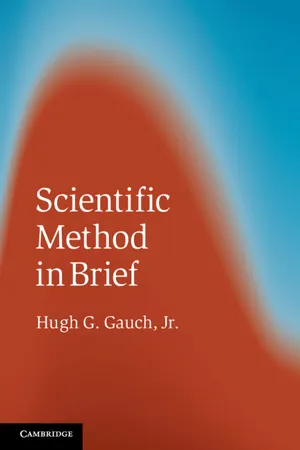Scientific Method in Brief
About this book
The fundamental principles of the scientific method are essential for enhancing perspective, increasing productivity, and stimulating innovation. These principles include deductive and inductive logic, probability, parsimony and hypothesis testing, as well as science's presuppositions, limitations, ethics and bold claims of rationality and truth. The examples and case studies drawn upon in this book span the physical, biological and social sciences; include applications in agriculture, engineering and medicine; and also explore science's interrelationships with disciplines in the humanities such as philosophy and law. Informed by position papers on science from the American Association for the Advancement of Science, National Academy of Sciences and National Science Foundation, this book aligns with a distinctively mainstream vision of science. It is an ideal resource for anyone undertaking a systematic study of scientific method for the first time, from undergraduates to professionals in both the sciences and the humanities.
Tools to learn more effectively

Saving Books

Keyword Search

Annotating Text

Listen to it instead
Information
Table of contents
- Cover
- Scientific Method in Brief
- Title
- Copyright
- Dedication
- Contents
- Foreword
- Preface
- 1 Introduction
- 2 Four bold claims
- 3 A brief history of truth
- 4 Science's contested rationality
- 5 Science's presuppositions
- 6 Science's powers and limits
- 7 Deductive logic
- 8 Probability
- 9 Inductive logic and statistics
- 10 Parsimony and efficiency
- 11 Case studies
- 12 Ethics and responsibilities
- 13 Science education
- 14 Conclusions
- References
- Index
Frequently asked questions
- Essential is ideal for learners and professionals who enjoy exploring a wide range of subjects. Access the Essential Library with 800,000+ trusted titles and best-sellers across business, personal growth, and the humanities. Includes unlimited reading time and Standard Read Aloud voice.
- Complete: Perfect for advanced learners and researchers needing full, unrestricted access. Unlock 1.4M+ books across hundreds of subjects, including academic and specialized titles. The Complete Plan also includes advanced features like Premium Read Aloud and Research Assistant.
Please note we cannot support devices running on iOS 13 and Android 7 or earlier. Learn more about using the app
